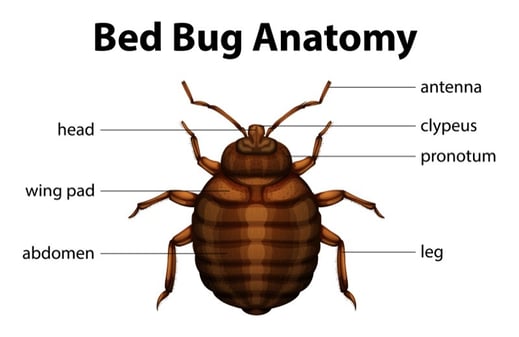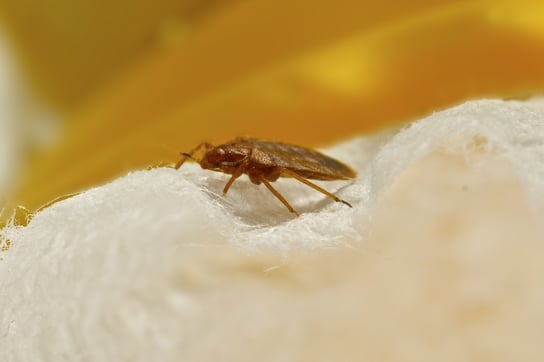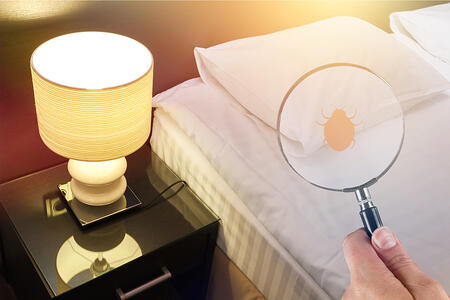In New Jersey and Pennsylvania, winter is usually equated to fewer pests in the house (except for rodents). Carpenter bees, hornets, centipedes, and mosquitoes are nowhere to be found when snow is on the ground and salt is on the roads. But what happens to bed bugs? Do they all die? Does the winter even affect them? Just because it’s cold outside doesn’t mean you can learn your guard down when it comes to bed bug prevention.
What do bed bugs look like?
Bed bugs are small rust-colored pests that are oval in shape and 3/16 - 1/4 inch long as adults (about the size of an apple seed). They don’t have wings and cannot jump or fly. Even though they don’t have wings, bed bugs can scale your walls with ease. It’s not unheard of for bed bugs to hide behind hung artwork or photos and in curtains.

If you are experiencing a bed bug infestation, you won’t see them continually crawling everywhere or trailing like the ants that you can find in your bathroom or kitchen. Bed bugs live in tight cracks and corners around box springs, bed frames, and even behind light socket plates. They leave their living spaces during feeding time when they find a host (us humans) close by. Bed bugs detect a live host by sensing CO2 that is expelled. After feeding, they go back to their hiding places rather than living on your skin or in your hair.

Does the cold affect bed bugs?
Bed bugs begin to die at temperatures below 0°F. Exposure to this temperature has to be consistent for at least 4 days to kill off these adaptable pests. It’s not something that typically is achievable without a professional bed bug freezing control program from a reputable pest control company. Throwing your mattress or suitcase outdoors in the winter will not do the trick. The heat from direct sunlight and moisture that is naturally in the air won’t allow bed bugs to truly reach a freezing point. Opening up the windows to your house on an especially cold January day won’t help either.
That being said, bed bugs prefer warm and moist environments. According to the EPA, “a female bed bug will produce between 1-7 eggs per day for about 10 days after a single blood meal. She will then have to feed again to produce more eggs. Due to the large number of eggs a female can produce under optimal conditions (temperatures >70°F but <90°F, and in the presence of a host), a bed bug population can double every 16 days.” Bed bugs can multiply very quickly when under the right conditions. During the winter, we use more heat. This means our home is a little warmer than normal. By turning the heat up and layering on extra comforters or blankets at night, bed bugs can more easily find resting humans.
Do bed bugs hibernate?
No, bed bugs do not hibernate. As a form of preservation, when faced with freezing temperatures, bed bugs can go into what’s called “diapause.” During this suspended state, bed bugs are more dormant than anything, preserving energy and halting development until conditions become livable again. Bed bugs do not live in colonies outdoors, so they usually don’t have to deal with extreme cold. Because they feed off of live, warm-blooded hosts that live indoors at comfortable temperatures, diapause is possible, but not something that’s frequently utilized or needed.
Are bed bugs worse in the winter when compared to other seasons?
Cold weather does not increase bed bug activity, but it does increase human activity. Traveling, flying, and staying in hotels during Thanksgiving and the holiday season increases the likelihood that you’ll encounter bed bugs.
Bed bug infestations spread when an individual comes into contact with bed bugs and unknowingly brings them somewhere else. They are transported as stowaways, hiding in luggage, couches, beds, pillows, or backpacks to name a few. Bed bugs cling to moving items like briefcases and can easily fall off, allowing them to relocate and spread. It’s also a common occurrence that bed bugs lay eggs on these items. As the host moves, they can fall off and hatch far away from where they originally came from. The number one thing to keep in mind is that bed bugs aren’t living in your lawn or under your deck. They need a host to carry them from an already infested item or room, into the house for a new infestation to occur.
Click here to read our blog post about how winter weather affects other common pests including, ticks, mosquitoes, and stink bugs.
How can I prevent getting bed bugs in the winter?

During winter travel, the number one thing you can do to prevent bed bugs is to inspect your hotel room before settling in. When you arrive at your room, go through the following steps:
Step 1: At hotels, pull back the sheets and inspect the mattress seams, particularly at the corners for telltale dark spots, eggshells, eggs, or live bed bugs. If you see anything suspect, notify management and change rooms or establishments immediately.
Step 2: Thoroughly inspect the entire room before unpacking, including behind the headboard of the bed and in the cracks and crevices of sofas and chairs. If any pests are spotted, change rooms or establishments immediately.
Step 3: If you do need to change rooms, be sure that you do not move to a room adjacent or directly above or below the suspected infestation. Bed bugs can easily hitchhike via housekeeping carts, luggage, and can even enter through wall sockets. If the infestation is spreading, it typically does so in the rooms closest to the origin.
Step 4: Consider placing your suitcase in a plastic trash bag or protective cover during the duration of your trip to ensure that bed bugs cannot take up residence there prior to departure.
Continue bed bug prevention when you get home! Remember: bed bugs travel by hitching rides. After your trip, inspect your suitcases before bringing them into the house. Vacuum your suitcase thoroughly before putting it back in storage. Consider using a garment hand steamer to steam your luggage, which will kill any bed bugs or eggs that may have hitched a ride home. Wash all of your clothes - even those that have not been worn - in hot water to ensure that any bed bugs that may have made it that far are not placed into your drawers or closet.
How can Cooper get rid of the bed bugs in my house?
Our bed bug technicians will utilize the following treatment methods to eliminate bed bug infestations in your NJ or PA home.
- Encasement of all mattresses and box springs.
- Following a visual inspection to determine where fecal matter from bed bugs is found, we will steam two feet around the affected area to ensure that they are eliminated.
- Application of environmentally conscious pesticides. Our technicians will use pesticide dust to eliminate pests behind beds, switch plates, carpet tack strips, etc. Liquid pesticides are also applied to baseboards to exterminate any bed bugs that may be hiding there.
While many other pest management companies require considerable amounts of prep work such as emptying closets, stripping beds, emptying drawers, etc., Cooper does not require this for most treatments. We realize that bed bugs can be very unsettling, and when you choose the experts at Cooper for extermination, we will give you piece of mind knowing that the problem is solved to your satisfaction and fully guaranteed.
Call us at 609-799-1300 or fill out the form on this page to schedule a bed bug inspection at your home or business!

